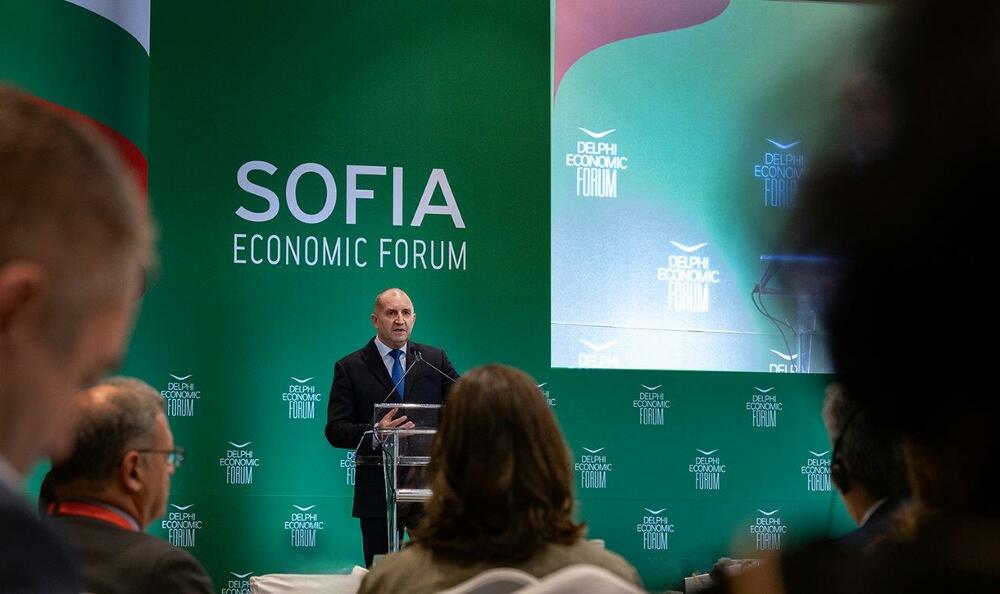site.btaUPDATED President Radev at Sofia Economic Forum: Amid Dynamic Geopolitical Processes, 2025 Set to Be Watershed Year for Bulgaria, Region, Europe, the World


The EU should reform its governance structure and decision-making mechanisms to act swiftly and allocate resources to its strategic ambitions, President Rumen Radev said at the Fifth Edition of the Sofia Economic Forum on Monday, the President's press secretariat said Tuesday.
Addressing representatives of institutions, businesses and diplomats, Radev emphasized that 2025 is shaping up to be a pivotal year for Bulgaria, the region, Europe and the world, due to the unprecedented acceleration in the dynamics of geopolitical processes.
"The geopolitical security architecture is collapsing, long-established economic models are cracking, recession has taken hold in leading European economies, and technological advancements continue to progress at an ever-faster pace," the President commented.
"At the core of Europe's wide-ranging issues is a leadership crisis with two key dimensions - competence on strategic matters for Europe and honesty towards European citizens and our partners," President Radev said.
He argued that identifying Europe's challenges is not enough to find an effective cure: "We must address the deep-rooted causes of today's situation rather than its symptoms." In his view, this requires honest answers to several questions, including how the EU has fallen behind in innovation, what has led to the current energy crisis, loss of competitiveness, and inability to guarantee the EU's own security.
The President acknowledged that the European Commission's new priorities - fostering research, innovation and technologies, and achieving strategic autonomy - are steps in the right direction for economic development and demonstrate awareness of the challenges.
Radev also addressed the issue of accountability for the hundreds of thousands of victims during Ukraine's counter-offensive, which many European leaders had encouraged with what he said were utopian assurances of victory over Russia. He asked why, although the collective GDP of the West is 25 times that of Russia, the latter manufactures three to four times more ammunition and military equipment, as stated by NATO's Secretary General.
For years, the narrative has been that the Russian economy would collapse, yet it is European governments that are falling, and the EU's economic sanctions against Moscow are being undermined by countries in the Global South purchasing Russian energy resources, Radev added.
Amid these crises and the exaggerated fears surrounding Donald Trump's return to the US presidency, Europe must take responsibility for its own security, but it should also start building a dynamic and competitive economy, unite, and take decisive steps forward, Radev noted.
The need for increased defence spending should be guided by clear principles and a collective European approach to a comprehensive national security concept. This requires the development of connectivity, logistics, mobility and the implementation of advanced technologies, said Radev. He emphasized that smaller NATO Member States, as part of an Alliance united by shared values, should participate equally in the design and manufacture of defence products. "Otherwise, the technological divide between Member States will widen, and NATO will turn into a market of producers and buyers," the President commented.
Regarding alarming trends in the European economy and the need for investments, the President argued for a balance between public funding and private capital, which calls for single markets, a common industrial and financial policy, and consolidation of Europe's fragile and fragmented capital markets.
Europe also faces the challenge of enhancing its global geopolitical role and maintaining its moral leadership in human rights, the rule of law, peace policies and environmental efforts. The EU has been a global leader in green policies for decades, but Europe must increase, instead of losing its competitiveness in the process, the President stressed. He added that Europe's pro-liberal and pro-market approach should be reassessed in the context of increasingly protectionist policies of other global players.
The President said he expects Europe to navigate these challenges successfully, but this will require deep reforms in the EU's governance structure and decision-making mechanisms to enable swift action and the allocation of significant resources to its strategic ambitions.
Radev also noted that Bulgaria and Romania's accession to the free-travel Schengen area would provide a positive economic boost to the region. He highlighted Bulgaria's contributions to developing an innovative and productive economy, from raw material extraction and processing, to heavy industry and metallurgy, to energy production and storage from domestic sources, to digitalization and high-tech production.
The President underscored Bulgaria's consistent efforts to improve connectivity with its neighbours, expressing hope that the Republic of North Macedonia would recognize the importance of building Pan-European Corridor 8 for Europe. Radev also stressed the need of enhancing transport links with Romania along the Danube.
At the Sofia Economic Forum, experts discussed energy security, cooperation and pathways to improving Bulgaria's economic competitiveness.
/DD/
news.modal.header
news.modal.text